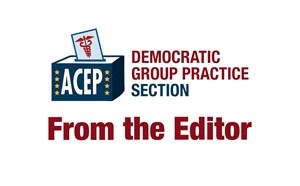
Summa Health Care Transition
The ACEP Democratic Group practice section has been following the Summa Health Emergency Department story very closely. It is our section’s belief that patients get the best care when dedicated physicians actively involved in managing the practice are involved in department decisions. The decisions not only include point of service patient care decisions, but also group and hospital level decisions such as patient protocols and staffing patterns. A democratic group with actively engaged members is best able to accomplish these goals.
The dust still hasn’t settled, but it appears that the results of the Summa Health negotiations weren’t the outcomes that any of the stakeholders would have wanted, and certainly wasn’t in the best interest of patients or residents.
In the waning hours of December 31st, 2016, contract negotiations between Summa Health and Summa Emergency Associates (SEA) collapsed. Eight hours later, at midnight, their 40- year working relationship at 5 Emergency Departments including an Emergency Medicine residency ended. U.S. Acute Care Solutions (USACS), by their account with less than one week’s notice of this possibility, stepped in at midnight at all five Emergency Departments. With no time for any training in the EMR or department policies and protocols, the staff scrambled to ensure patient safety.
Overnight, the 65 SEA Emergency Physicians were out of work and the 30 Emergency Medicine Residents were in fear for their training. On January 6th, 250 members of the Summa Health Medical Staff signed a no-confidence vote regarding Summa’s CEO, Thomas Malone, MD. On January 26th, Dr. Malone resigned from his post.
On February 10th, the Accreditation Council on Graduate Medical Education (ACGME) stripped Summa of their accreditation to train emergency medicine residents and put them on immediate probation, prohibiting the health system from starting new residency programs or increasing the size of those that already exist. The twenty residents in their first or second year of training must find a new hospital by July 1st in order to finish their training. The program has the option to appeal the probation, and states they plan to within the 30 day period following the sanctions. This remains a fluid, though obviously precarious situation to be in.
The section recognizes that there will always be changes of contracts. Diligence in the changing of the guard is paramount. Not only could patient care have suffered, but it seems a successful residency has been placed in jeopardy.
Every group structure will bring pros and cons to the hospital and therefore patients. Because democratic group are made up of owners all physicians have a vested interest in point of service patient care, the success of the department and the success of the institution. After all, the ED is the front door to the hospital for most patients. This is evident through:
- Complete engagement on CMS initiatives such as patient flow, patient experience, sepsis, pneumonia and even inpatient metrics such as how the ED can prevent CLABSIs (central line associate blood stream infections) and CAUTIs (catheter associated UTIs).
- Active participation on hospital committees.
- Partnership and leadership on hospital service lines such as trauma, stroke, sepsis, acute coronary syndrome, orthopedics, and hypothermia.
A democratic group structure will have multiple physician leaders willing to get involved and fewer physicians interested solely in punching the clock as might be found in a large corporation.
Only the parties directly involved in the Summa transition will ever know the exact details of what transpired. The links below will help anyone interested to learn more. As we see more contracts change hands the best way to value an emergency group may not always boil down to who needs the smallest stipend or if they can take the hospitalist or anesthesia contract off the hospital hands. A more important question may be, will their physicians be engaged in the hospital, health system and community.
To read more:
- http://www.acepnow.com/article/summa-transition-directly-principals/
- http://epmonthly.com/article/deal-breakers-summa-story/
- http://journals.lww.com/em-news/blog/BreakingNews/pages/post.aspx?PostID=372
Jay Mullen, MD, MBA, FACEP
Secretary/Newsletter Editor



